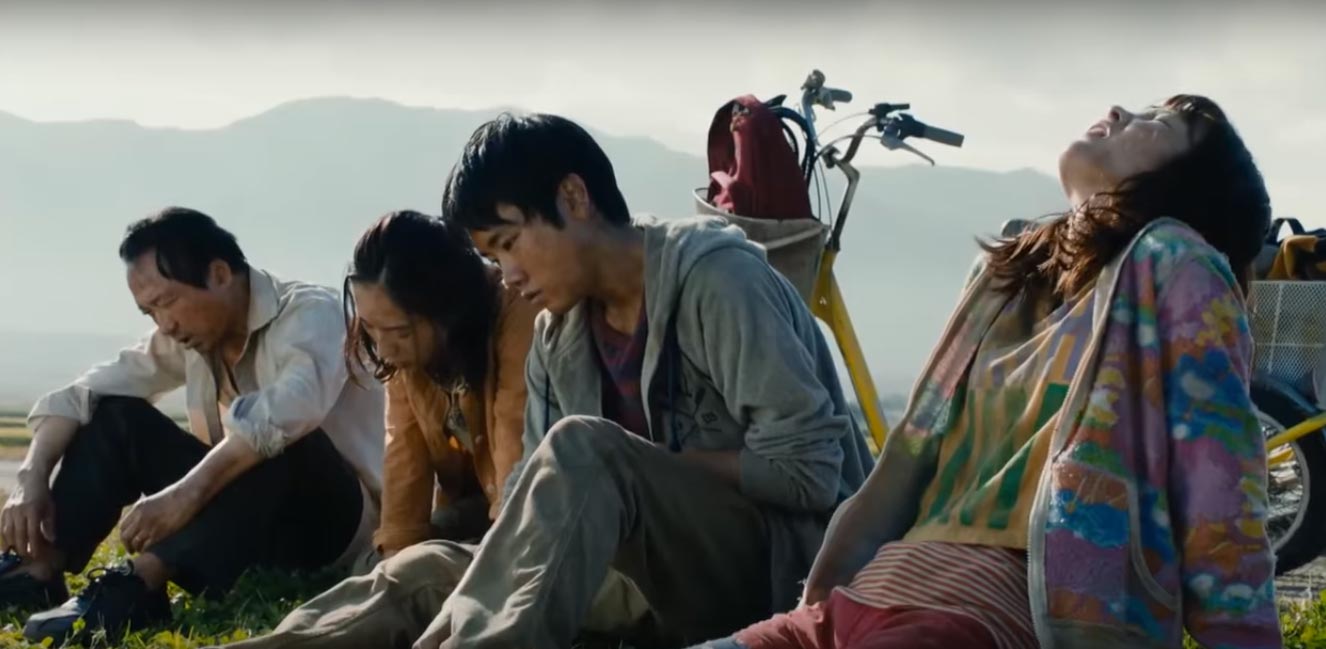The end of civilization as we know it has been a recurrent theme in modern fiction for some time, with all manner of post-apocalyptic films, television shows, comics and video games scattered throughout the pop cultural wasteland. Most of these works take it as a given that the primal darkness in the heart of man will inevitably triumph. Survival Family is resplendently refreshing in that although it deals with the harsh realities of disaster, its optimism and the positive lessons learned by its characters shines through.
Survival Family tells the story of the Suzukis, a typical modern Tokyo family in caught in the immediate aftermath of a mysterious blackout that has somehow rendered every known electrical device completely inoperable. What at first appears to be a localized power outage soon reveals itself to be a wide scale crisis. As the severity of the disaster sets in, panic slowly takes over as the city’s citizens wait desperately for the power to return. The Suzukis in particular face dire straits, spoiled as they are by petty avarice and ill prepared to face life without its modern conveniences.
Fumiyo Kohinata stars as the patriarch Yoshiyuki, an average salary man who is diligent at his workplace but apathetic and distant to his family at home. Eri Fukatsu Eri stars as Mitsue, a housewife and mother who doesnt seem to be particularly well equipped for either role, loving and kind as she may be. Yuki Izumisawa plays their son Kenji, a tech obsessed high school geek on the lower end of the social totem pole. Wakana Aoi plays his sister Yui, aloof and and unconcerned with anything beyond the scope of her group chats and the eternal high school girl quest for popularity.
Long standing issues like economic recession and the more recent Fukushima nuclear disaster serve as significant subtext, while a commentary on the famous polite civility of Japanese society colors the proceedings and further separate it from a typical disaster flick. While most end-of-the world scenarios in western films present a rapid and violent breakdown of society in the face of crisis, the first half of Survival Family shows a society clinging fastidiously to its everyday routine as best it can. Commuters revert to bicycles as their means to work or school, cashiers at the supermarket resort to the use of an abacus to calculate transactions, and banks dole out rationed monetary withdrawals via official seals along with proper identification.
Despite this initial adherence to normalcy, it soon becomes clear that living in the city will be unsustainable, as fresh water and supplies grow scarce. Many choose to evacuate the city for their traditional rural family homes.
Despite Yoshiuki’s stubborn resistance, the Suzuki family eventually follows suit and heads for the farm of Mitsue’s father to the south. As all manner of modern vehicles require batteries, the family is forced to pedal their way to what they think will be their saving grace at the airport, never stopping to consider that airplanes are now also inoperable. Faced with the harrowing prospect of a journey that could take them well over a full month to complete, the Suzuki family ventures forward to an uncertain fate.
Survival Family is very much a black comedy of errors. Though it mostly maintains a humorous tone, there are always serious stakes at play which result in several moments of emotional intensity.
The ineptitude of each family member in any given situation leads to a hilarious pratfall, yet those defeats often come with dire consequences. Bodies are bruised and broken just as easily as their egos. This is more than a mere romp in sadism however, as each family member experiences a significant arc as the story goes along. The characters grow and change with each external hardship and interpersonal conflict they endure, and that’s what keeps you hooked and rooting for the Suzukis to survive.
Along with being a brilliant satire, Survival Family turns out to be one of the best family adventures I’ve seen so far this decade. There is some strong language and a bit of mature subject at play, but for the most part I would highly recommend seeing this movie with your whole family. The setting and cultural background of Survival Family is unique to Japan, yet the themes and archetypes that the film plays with are universal.
online pharmacy purchase singulair online best drugstore for you
This film is a both a shining example of Asian cinema and evidence of cinema’s universal human appeal that should not be missed.
online pharmacy purchase cipro online best drugstore for you







